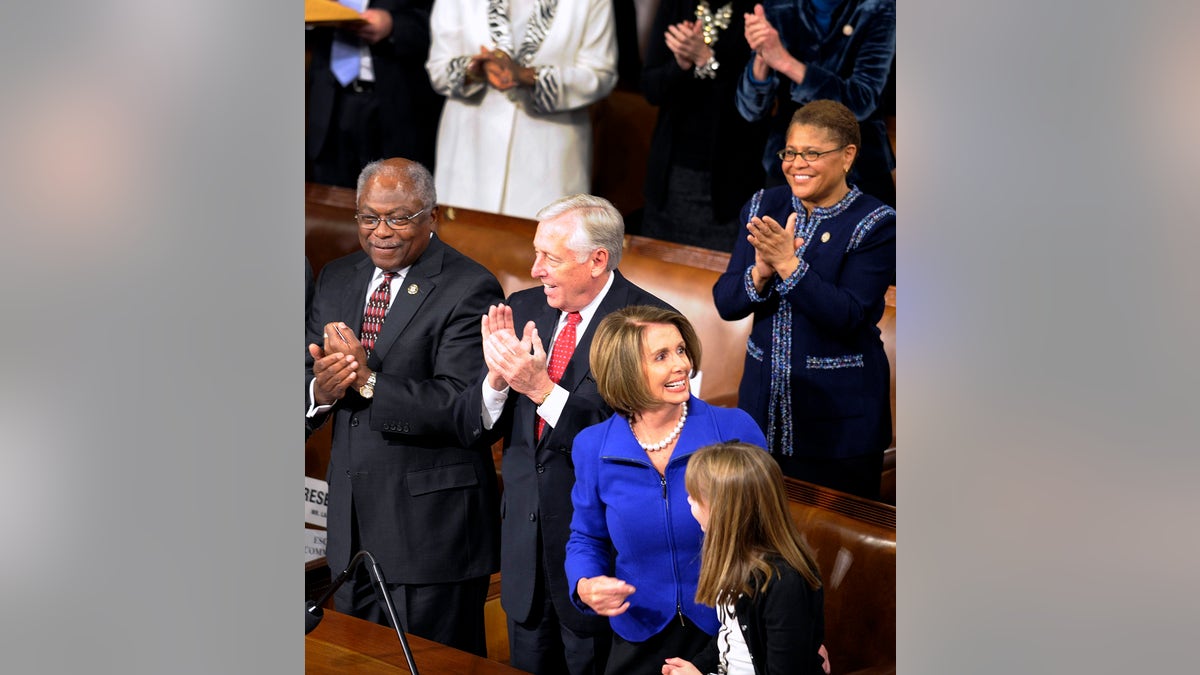
Outgoing House Speaker Nancy Pelosi of California reacts to the applause during the opening session of the 112th Congress. Assistant House Minority Leader James Clyburn of South Carolina is at left and House Minority Whip Steny Hoyer of Maryland stands in the middle.
The decision by several Democrats not to vote for Nancy Pelosi as House speaker on Wednesday may have been an act of principle or political expediency after the disastrous outcome of November's midterm elections.
But with Pelosi -- who has been cast by some as an iron-fisted ruler -- still in charge of her party in the House for the next two years, those Democrats may find their political ambitions thwarted.
Nineteen Democrats refused to support Pelosi for speaker, including two who voted for each other. And a 20th, Rep. Peter DeFazio of Oregon, who led a failed effort after the election to postpone a vote on the party leader, skipped the day's events.
In the end, the votes against Pelosi were little more than symbolic, since the Republican majority easily elected John Boehner as speaker. But it was the largest number of defections for any formal candidate for speaker since 1997, when nine Republicans voted against House Speaker Newt Gingrich – an embarrassment that Pelosi is unlikely to forget.
Rep. Heath Shuler, D-N.C., who challenged Pelosi for the job, received 11 votes -- a result that he hailed as historic.
"The American people are tired of the usual partisan bickering and gridlock that prevents us from moving our country forward," Shuler said in a written statement. "We need more moderate voices in Congress - on both sides of the political aisle -- that represents the majority of Americans, not just the fringes on the right and left. That's what this campaign was about."
But Shuler's moderate Democratic allies are a dwindling bunch. The Blue Dog coalition of centrist Democrats lost 28 members in November while only three liberals lost.
The other Democrats who received votes on Wednesday were Reps. Steny Hoyer of Maryland, Jim Cooper of Tennessee, Dennis Cardoza and Jim Costa of California, Marcy Kaptur of Ohio and John Lewis of Georgia.
Many of these Democrats blame Pelosi for the beating they took in November. Countless GOP campaign ads had depicted Pelosi and her allies as out-of-touch liberals. Eleven House Democrats kept campaign promises by voting for fellow centrist Shuler.
Pelosi, who has a strong backing from the bulk of her caucus, may send a message when she announces committee assignments. She's done it in the past.
In 2008, Rep. John Dingell lost his chairmanship of the powerful Energy and Commerce Committee after releasing a global warming bill that was seen as a poke in the eye to Pelosi since it would have prevented states like Pelosi's California from setting tougher auto emissions standards than the federal government.
In 2006, Pelosi passed over Rep. Jane Harman for the chairmanship of the House intelligence committee after complaints that she didn't challenge the Bush administration's alleged abuses of intelligence.
But Pelosi's camp rejects the notion that Pelosi acts like a caucus dictator, saying she's not thinking about exacting revenge.
"Democrats are looking forward, and our top priority is creating jobs for the American people," Pelosi spokesman Drew Hammill said in a statement to FoxNews.com. "As we begin the 112th Congress, each proposal will be measured by a simple test: Will it create jobs? Will it strengthen our middle class? Will it reduce the deficit?"
A leadership aide told FoxNews.com that Wednesday's vote was just "symbolic" and that there has been no dramatic changes made on committees in which some of the rebellious Democrats are on. For example, Shuler, who was elected to the Steering and Policy Committee last month, has not been removed, the aide noted.
"The party's priority is to protect all members, but a no vote against caucus unity could hurt them with various base groups like labor, African American groups, Latino community, progressive groups and others," the aide said.
Democrats who voted against Pelosi didn't respond to requests for comment. But DeFazio says he skipped Wednesday's largely ceremonial events because he chose to hear first-hand the concerns of veterans at a meeting at a Veterans Affairs health center in his district. DeFazio was sworn in by House Speaker John Boehner on Thursday morning.




